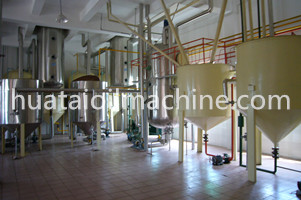Edible oil Refining methods,
Palm oil refinery
Palm oil is the oldest and most consumed cooking oil in Nigeria. The making and selling of palm oil for commercial purposes and for home consumption.
The palm oil is the oil extracted from the fruits of palm tree, it is one of the basic components of our traditional dishes in Nigeria.
Edible oil refining is according to the different usage and requirements, utilizing the physical methods and chemical methods to get rid of the harmful impurities and needless substance in the crude oil, getting standard oil.
Advantages of
cooking oil refining machine:
The purpose of Degumming is to remove gums in the crude oil to improve oil edibility, storage and do well to downstream neutralizing section. All oils have hydratable and non-hydratable gums.
The purpose of Neutralizing is to remove Free-Fatty Acids (FFAs). Traditionally, FFAs are treated with caustic soda (NaOH).The reaction produces Soaps which are separated from the oil. The caustic soda reacts with free fatty acids (FFA) present in the oil and forms soap stock. The soap stock is then removed by a centrifugal separator and oil is washed with water for the complete removal of soap stock. The wash water is separated out by centrifugal separators.
The purpose of Bleaching is to remove color pigments contained in oils. The oil is treated with Bleaching Clays that adsorb the color pigments. The clay is filtered and the clean bleached oil is stored for further processing. The bleaching agent is filtered out in vertical pressure leaf filters. A multi-part design ensures uniform consistency in color with minimum bleaching agent requirements. The bleaching line is versatile and adaptable for all varieties of vegetable oil.
The purpose of Deodorization is to remove odor substances. Every vegetable oil has its own distinct natural odor. During neutralization and bleaching, unpleasant odors are imparted in the oil, thereby making it essential to remove this odor. The oil is subjected to steam distillation under high temperature and vacuum to evaporate all odor substances. The resulting deodorized oil is almost bland and tasteless.
The purpose of Winterization is to remove waxes especially in those oils that contain waxes. Such oils are subjected to chilling and filtration to remove waxes and other high melting point substances. Oils like sunflower oil or maize germ oil (corn oil) have waxes present in them. At low temperatures these waxes give a hazy appearance to the oil. It is therefore essential to remove these waxes prior to bottling and marketing of the oil.
Winterizing is also used to separate the unsaturated fats from unsaturated fats—especially in
Palm Oil Refining or other saturated fats. The chilling process solidifies the saturated fats; thus enabling separation via filtration.

